I SAY YOU WANT THIS REVOLUTION
After the Revolution is a chewy new play about family dynamics and the difficulty of making moral judgments, especially after the fact. For audiences thirsting for a literate, intelligent, stimulating, and accessible new play, it will fill the bill nicely. The Amy Herzog 2010 drama premiered Off Broadway and is now being presented in a Bay Area premiere at the Aurora Theatre in a solid production that features 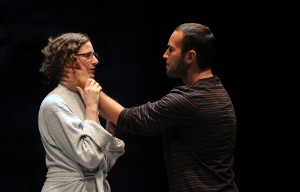 three generations of very fine actors. (Herzog’s equally engaging 4000 Miles played at A.C.T. earlier this year.)
three generations of very fine actors. (Herzog’s equally engaging 4000 Miles played at A.C.T. earlier this year.)
After the Revolution centers on an East Coast Jewish family of ostentatiously liberal socio-political views. Ben Joseph is an in-your-face Marxist, a high school teacher who loves to roil the PTA with his outspoken left wing views. His daughter Emma is a 26-year old woman who just graduated from law school and heads the Joe Joseph Fund, a legal fund dedicated to battling social injustice and named after her recently deceased grandfather. The fund’s current high profile cause is getting a new trial for a Black Panther leader convicted of killing a white police officer.
Emma’s hero is her grandfather, an iconic martyr to leftists, for refusing to name names before congress in the 1950s, costing him his government job and earning him a place on the McCarthy era blacklist. Emma’s ideals are shattered when her father informs her that Joe Joseph passed U.S. government secrets to the Soviet Union during World War II. Her sainted grandfather was actually a Russian spy who 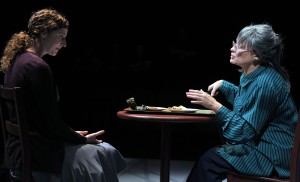 lied about his espionage activities under oath.
lied about his espionage activities under oath.
Emma is distraught over her grandfather’s perfidy and infuriated with her father for withholding the information, especially since he told her sister Jess four years previously. The revelation leads to a rupture between Ben and Emma, with the many peripheral characters weighing in with their opinions to soothe the troubled domestic waters. The characters include Ben’s female companion Mel, his stepmother Vera, his brother Leo, an elderly fund donor named Morty, and Emma’s boyfriend and fund co-worker Miguel.
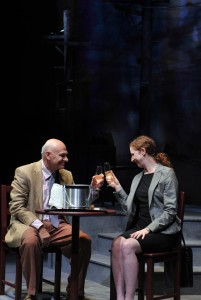 While Emma seethes with outrage over the revelation about her grandfather, people around her take a more temperate view. After all, the Soviet Union was our ally during the war and was making far greater sacrifices to defeat the fascists than the United States. Plus, the espionage took place decades ago (the play is set in 1999) when attitudes were far different. Family members imply that Emma should cut her grandfather some slack. He was imperfect (as we all are) but he was still a fearless foe of social injustice.
While Emma seethes with outrage over the revelation about her grandfather, people around her take a more temperate view. After all, the Soviet Union was our ally during the war and was making far greater sacrifices to defeat the fascists than the United States. Plus, the espionage took place decades ago (the play is set in 1999) when attitudes were far different. Family members imply that Emma should cut her grandfather some slack. He was imperfect (as we all are) but he was still a fearless foe of social injustice.
The play brings up challenging questions about the difficulty of assigning moral blame for acts that happened years ago in different circumstances. Emma disassociates herself from her father, who is crushed by her alienation, and the domestic fracture filters through the entire family. To her credit, Emma eventually undergoes a sea change in her social sensibilities. The civil rights movement is united in believing that the Black Panther was railroaded by a racist trial with a racist judge presiding. All this may be true, Emma says, but what if the man is guilty of murder anyhow? Surely that counts for something. Emma’s sudden wavering over the certainties of the liberal position about the Black Panther is anathema to ultra-liberals who wear blinders in holding up the Black Panther as a victim of a racist society, as if his guilt or innocence is irrelevant.
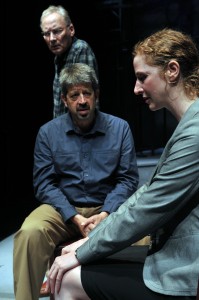 Emma is the lightning rod for Herzog’s play, but the character is somewhat flawed. Emma’s reaction to her grandfather’s espionage comes across as a little prissy and self-indulgent. Emma’s anguish is more like a snit, assuming a judgmental stance that oozes self-righteousness. But then again, her disillusionment is genuine so maybe it’s unfair to criticize her as a spoiled young woman who is angry that she’s been left out of the family loop. That’s just one more matter audiences can argue over.
Emma is the lightning rod for Herzog’s play, but the character is somewhat flawed. Emma’s reaction to her grandfather’s espionage comes across as a little prissy and self-indulgent. Emma’s anguish is more like a snit, assuming a judgmental stance that oozes self-righteousness. But then again, her disillusionment is genuine so maybe it’s unfair to criticize her as a spoiled young woman who is angry that she’s been left out of the family loop. That’s just one more matter audiences can argue over.
Jessica Bates makes an impressive Aurora Theatre debut as the passionate, self-involved Emma. She is nicely matched with the dominating, and domineering, presence that Rolf Saxon gives Ben Joseph. As the senior citizens in the play, Peter Kybart and Ellen Ratner are a total joy in their few scenes, Kybart’s Morty being compassionate and droll and Ratner’s Vera feisty and opinionated (she has the play’s last words, and they are not conciliatory). My only quibble with Ratner is that, through no fault of her own, she is clearly too young to play the grandmother.
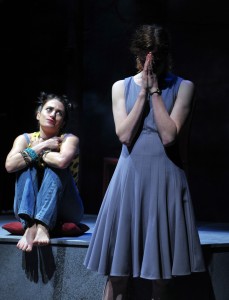 There is also a good complementary contribution from Victor Talmadge as the peacemaking Leo, who refuses to see issues in black and white doctrinaire fashion like a true far leftist. Adrian Achondo is an empathetic Miguel, who struggles with Emma’s self-involvement. Sarah Mitchell is endearingly quirky as the no-good sister Jess and Pamela Gaye Walker is fine as Ben’s partner, Mel. Joy Carlin’s directing allows the script’s literacy, wit, and emotion to shine through with credible realism, but there could have been a bit more urgency to the proceedings (for a left-wing Jewish family, this clan seemed awfully temperate). The only confusing element was J.B. Wilson’s set design of ugly furniture and incongruent giant telephone poles in the background–for the life of me, I couldn’t figure out the metaphor in those poles. The simple set design also offered no respite from overly long scene changes (do actors really have to do that job?). Callie Floor designed the costumes, Chris Houston the sound, and Kurt Landisman the lighting.
There is also a good complementary contribution from Victor Talmadge as the peacemaking Leo, who refuses to see issues in black and white doctrinaire fashion like a true far leftist. Adrian Achondo is an empathetic Miguel, who struggles with Emma’s self-involvement. Sarah Mitchell is endearingly quirky as the no-good sister Jess and Pamela Gaye Walker is fine as Ben’s partner, Mel. Joy Carlin’s directing allows the script’s literacy, wit, and emotion to shine through with credible realism, but there could have been a bit more urgency to the proceedings (for a left-wing Jewish family, this clan seemed awfully temperate). The only confusing element was J.B. Wilson’s set design of ugly furniture and incongruent giant telephone poles in the background–for the life of me, I couldn’t figure out the metaphor in those poles. The simple set design also offered no respite from overly long scene changes (do actors really have to do that job?). Callie Floor designed the costumes, Chris Houston the sound, and Kurt Landisman the lighting.
It’s fashionable to sneer at political and social conservatives as intolerant ideologues, but After the Revolution paints left-wingers with the same brush. It’s a novel position in contemporary American theater and one to give the thoughtful viewer pause. Can liberals like the Joseph family claim ownership to the moral high ground? Maybe, maybe not.
photos by David Allen
After the Revolution
Aurora Theatre in Berkeley
scheduled to end on September 29, 2013EXTENDED through October 6, 2013
for tickets, call (510) 843-4822 or visit http://www.auroratheatre.org

